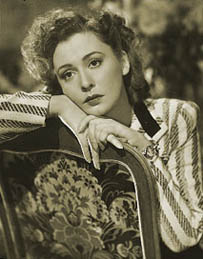 [---][center][large]Die Große Liebe[/large][/center][---]
[---][center][large]Die Große Liebe[/large][/center][---]
[justify]Die grosse Liebe or Die große Liebe (The Great Love) is a German drama film of the National Socialist period, made by Rolf Hansen, starring Zarah Leander and Viktor Staal. It premiered in Berlin in 1942 and went on to become the most commercially successful film in the history of the Third Reich.[/justify]
[center]Die Große Liebe - 1942.avi (698.94 MB)
[large]https://mega.co.nz/#!XVMBhaqB!NhJT3AcNZ ... s_oYLbgXVY[/large][/center]
[justify]Story
The attractive Oberleutnant Paul Wendlandt is stationed in North Africa as a fighter pilot. While in Berlin to deliver a report he is given a day's leave, and on the stage of the cabaret theatre "Skala" sees the popular Danish singer Hanna Holberg. For Paul it is love at first sight. When Hanna visits friends after the end of the performance, he follows her, and speaks to her in the U-Bahn. After the party in her friends' flat he accompanies her home, and chance throws them further together when an air raid warning forces them to take cover in the air raid shelter. Hanna reciprocates Paul's feelings, but after a night spent together Paul has to return immediately to the front.
There now follows a whole series of misunderstandings, and one missed opportunity after another. While Hanna waits in vain for some sign of life from Paul, he is flying on missions in North Africa. When he tries to visit her in her Berlin flat, she is giving a Christmas concert in Paris. Nevertheless their bond grows in strength and arouses the jealousy of the composer Rudnitzky, who is also in love with the singer. Paul asks Hanna in a letter to marry him. However, when he is finally able to visit her, he is called away again on the night before the wedding. Hanna, disappointed, leaves for Rome, where she has to make a guest appearance. Even when Paul manages to get three weeks' leave and follows Hanna to Rome, the wedding has still to be postponed: Paul feels so strongly that he is needed at the front that he goes back even though he has not been ordered to do so. Hanna does not understand this, and there is an argument, after which Paul thinks he has lost her for ever.
The war against the Soviet Union breaks out (1941) and Paul and his friend Etzdorf are sent to the Eastern Front. When Etzdorf is killed, Paul writes a farewell letter to Hanna, to make the dangers of his missions easier to bear. Only when he himself has been shot down and wounded and is sent to a military hospital in the mountains does he see Hanna again, who is still prepared to marry him. The last shots of the film show the happy couple, confident in the future, looking skywards where squadrons of German bombers fly past.[/justify]
[center]Cast
The starring roles were played by Zarah Leander as Hanna Holberg and Viktor Staal as Paul Wendlandt.
Other parts were played as follows:
Grethe Weiser: Käthe, Hanna's dresser
Paul Hörbiger: Alexander Rudnitzky, composer
Wolfgang Preiss: Oberleutnant von Etzdorf
Hans Schwarz jr.: Alfred Vanloo, artist
Leopold von Ledebur: Herr von Westphal
Julia Serda: Jenny von Westphal
Victor Janson: Mocelli, theatre director
Agnes Windeck: Hann's mother
Paul Bildt: Head waiter
Erich Dunskus: man with dog
Olga Engl: old lady in block of flats
Karl Etlinger: man with admission tickets
Ilse Fürstenberg: air raid shelter attendant
Grete Reinwald: mother in air raid shelter
Ewald Wenck: Berlin taxi driver
Just Scheu: Alfred Vanloo's brother
Erna Sellmer: ticket collector[/center]
 [justify]Musical numbers
[justify]Musical numbersDavon geht die Welt nicht unter (It's Not the End of the World)
Blaue Husaren (Heut' kommen die blauen Husaren) (Today the Blue Hussars Are Coming)
Ich weiß, es wird einmal ein Wunder gescheh'n (I Know a Miracle Will Happen)
Mein Leben für die Liebe - Jawohl! (My Life for Love - Jawohl!)
All the songs were composed by Michael Jary, with lyrics by Bruno Balz and sung by Zarah Leander. "Davon geht die Welt nicht unter" and "Ich weiß, es wird einmal ein Wunder gescheh'n" were two of the biggest hits of the National Socialist period, and because of their political subtexts were much approved of and promoted by the authorities. After 1942, as the military situation became more and more unfavourable to Germany, they became a staple element of the prevalent informal propaganda geared to "seeing it through". Nowadays, "Ich weiss, es wird einmal ein Wunder geschehen" and "Davon geht die Welt nicht unter" are idioms in German language.[/justify]